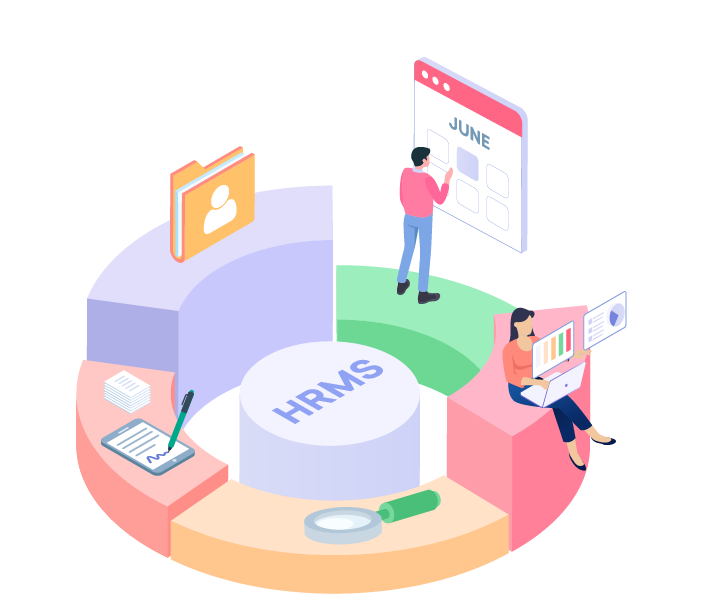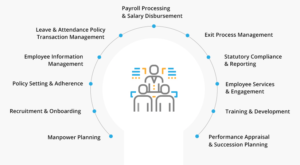How HR Management System can benefit SMEs and Startups?


Over 70% of small firms identify HR challenges as significant barriers to growth, making the adoption of HRMS technology increasingly essential.
By streamlining onboarding and performance management processes, HRMS enables SMEs to allocate resources more efficiently and focus on strategic initiatives.
Moreover, the data-driven analytics offered by these systems can enhance employee satisfaction and retention, key factors driving profitability.
In this article, we will explore how HRMS can revolutionize how SMEs and startups manage their HR processes, from recruitment and onboarding to performance management and compliance.
Why Do SMEs and Startups Not Use HRMS?
Many SMEs and startups shy away from adopting HRMS despite its clear benefits. Several factors contribute to this hesitation, and it’s important to understand these challenges to address them effectively.
Perception of High Costs
One of the primary reasons SMEs and startups avoid HRMS is the perception that it’s too expensive.
Many business owners believe HRMS solutions are tailored for larger companies with extensive budgets. They often assume that implementing an HRMS involves hefty upfront costs, subscription fees, and ongoing maintenance, which they may not feel justified in spending when managing their finances conservatively.
This perception leads them to rely on manual methods, such as spreadsheets, emails, and paperwork, which can seem more affordable in the short term but prove costly over time in terms of efficiency and errors.
Lack of Awareness or Misconceptions
Many business owners and founders don’t fully understand the capabilities of modern HRMS platforms. They may not realize that these systems are scalable and designed to grow with the company.
Some startups and SMEs think HRMS is only relevant when they reach a certain size, but in reality, even small teams benefit from automation in HR processes.
Misconceptions about HRMS’ complexity or a belief that it requires specialized IT expertise also contribute to their reluctance.
Preference for Traditional Methods
SMEs and startups often prioritize speed and agility, so they stick to familiar processes. Leaders accustomed to handling HR tasks manually may resist adopting new technology due to comfort with existing methods.
The thought of transitioning to a digital HR system can feel like an unnecessary disruption, especially if the business has been managing with manual systems for years.
Business owners may believe that existing methods work well enough, even if those processes lead to inefficiencies as the company scales.
Limited IT Resources
SMEs and startups often operate with lean teams and lack dedicated IT departments. This creates a barrier to adopting new technology like HRMS.
Without in-house technical support, business owners worry about their ability to handle technical issues, integrations, and ongoing system maintenance.
The fear of running into problems they can’t easily solve becomes a significant deterrent, even when the platform itself is designed to be low-maintenance and user-friendly.
Short-term Priorities Overlook HRMS Benefits
Leaders may view HRMS as something they can implement “later,” once they’ve established more pressing business aspects.
This short-term thinking often postpones investing in tools that could improve day-to-day operations, freeing up time and resources to focus on growth initiatives.
How HRMS can benefit SMEs and Startups

Efficient Recruitment and Employee Onboarding
Hiring the right talent can make or break an SME or startup, especially in the early stages. HRMS simplifies and accelerates the recruitment process by automating job postings, tracking applications, and organizing candidate data in one place.
Instead of manually sifting through resumes or tracking interviews on spreadsheets, HR managers can use HRMS to filter applicants, schedule interviews, and even integrate with online job platforms.
The onboarding process also becomes smoother, with automated workflows that ensure new hires complete necessary paperwork, receive company orientation materials, and set up their accounts, all without HR having to manage each step individually.
You can also read : Benefits of Automating the Applicant Onboarding Process
Enhanced Employee Management
As SMEs and startups grow, managing employee information manually becomes inefficient and error-prone. HRMS allows businesses to store and access all employee-related data, including attendance, leaves, salaries, performance reviews, and benefits, in one centralized system.
This eliminates the need for multiple spreadsheets or paper files, reducing the risk of data errors and providing easy access to critical employee information.
When HR professionals comprehensively view each employee’s profile, they can make more informed decisions about promotions, pay raises, and workforce planning, contributing to a better employee experience and retention.
You can also read: Benefits of using Project Management System in Startups and SME
Processing Payroll
Payroll processing is one of the most time-consuming and sensitive tasks for any business. SMEs and startups often struggle with manual calculations, compliance with tax regulations, and ensuring accuracy.
HRMS automates the entire payroll process, from calculating salaries to handling tax deductions and generating payslips. It integrates time and attendance data, leave balances, and performance-related incentives to ensure that employees get paid accurately and on time.
HRMS like Juntrax by Juntrax Solutions automatically fetches data from other management systems like timesheet management and attendance management. It also provides templates for the final invoice.
This makes payroll processing extremely convenient and only requires one individual to do the job.
By automating payroll, you can eliminate the risk of human errors, reduce the administrative burden, and ensure compliance with local tax laws and labor regulations.
Additionally, HRMS allows employees to access their pay stubs and tax information through self-service portals, enhancing transparency and trust within the organization.
Improved Compliance Management
Navigating labor laws, tax regulations, and employee benefits can be overwhelming for small businesses without dedicated HR departments. HRMS helps SMEs and startups stay compliant by automating compliance tracking and alerting HR teams about regulatory deadlines or updates.
HRMS reduces the risk of costly fines or legal issues that often arise from non-compliance, from managing employee contracts and work hours to filing reports for government compliance.
By ensuring that the business adheres to legal requirements, HRMS not only protects the company from penalties but also boosts its reputation as a responsible employer.
Boosted Productivity through Automation
Time and resources are limited for SMEs and startups, and the ability to automate repetitive tasks is crucial.
HRMS automates time-consuming processes like payroll management, leave tracking, and benefits administration, freeing HR teams to focus on strategic initiatives contributing to business growth.
Automated systems reduce manual errors and eliminate redundant processes, ensuring that HR tasks get completed accurately and on time.
You can also read: Do SMBs, SMEs, and Startups need Automated Solutions?
Scalability and Flexibility
HRMS platforms are designed to scale with a business’s growth, making them ideal solutions for SMEs and startups.
Whether a company has 10 employees or 100, HRMS can easily adapt to increased HR demands without requiring significant changes to the system.
As a startup or SME grows, it can add more features, such as advanced performance tracking, benefits administration, or employee training modules, without overhauling the entire HR process.
This flexibility allows businesses to expand seamlessly without being bogged down by administrative complexities.
Cost Savings
While many SMEs and startups view HRMS as a costly investment, the long-term savings far outweigh the initial expenses.
Businesses can reduce administrative overhead and avoid costly mistakes by automating processes like payroll, attendance tracking, and compliance management.
Additionally, HRMS minimizes the need for extra HR personnel, as one or two HR professionals can manage the entire workforce efficiently through the system.
Cost savings extend to reduced employee turnover, as better HR management leads to higher employee satisfaction and retention.
Improved Employee Engagement and Retention
Startups and SMEs rely on a motivated and loyal workforce to drive growth, and HRMS plays a crucial role in enhancing employee engagement.
With features like self-service portals, employees can access their personal information, apply for leave, check pay stubs, and manage benefits on their own. This transparency and ease of access empower employees, making them feel more in control of their work life.
Furthermore, HRMS systems often include performance management tools that allow for regular feedback, goal-setting, and recognition, fostering a culture of accountability and achievement.
When employees feel valued and supported, they are more likely to stay with the company, reducing turnover and creating a stable workforce.
Bottom Line
HRMS offers a powerful solution by automating key HR processes, improving compliance, reducing costs, and fostering employee engagement. By integrating an HRMS early on, you can not only manage your workforce more efficiently but also create a scalable foundation that supports long-term growth.
HRMS systems like Juntrax offer a user-friendly environment for admins and employees. They do not require any extra resources and save you from the cost of hiring a professional team to handle them. lt can simply be managed by an individual with basic IT knowledge. It will help you sustain your work processes by providing remote and flexible access. Purchasing an HRMS can be the best decision you have ever made for the accomplishment of your enterprise.
To get an idea about Juntrax and its features, feel free to book a FREE Demo with us!
2 thoughts on “How HR Management System can benefit SMEs and Startups?”
Comments are closed.
My brother recommended I might like this website. He was entirely right. This post actually made my day. You can not imagine just how much time I had spent for this information! Thanks!